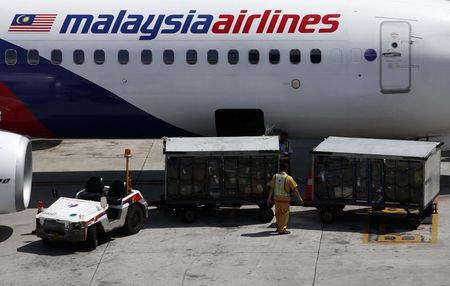By Brenda Goh and Siva Govindasamy
SHANGHAI/SINGAPORE (Reuters) - Fast forward a year, and Malaysia Airlines (KL:MASM) may have a new CEO, new logo, new livery, maybe even a new name, and fewer employees, airline insiders and brand experts said as the government signalled a "complete overhaul" of the loss-making carrier that has suffered two recent jetliner disasters.
MAS management has been working on a plan that could cut the national airline's over 19,000, largely unionised workforce, freeze pay, speed up retiring older planes and retrofit some of its current fleet to add seats, people close to the airline said.
As part of the restructuring, there have been calls from the airline's unions and others for CEO Ahmad Jauhari Yahya, or AJ as he's more popularly known, to go. People close to MAS said Ahmad was already planning to stand down before the two disasters - and that could happen by the year-end.
Managers are also reviewing the carrier's route network, given that its load factor - a measure of how full its planes are - fell sharply after Flight MH370, a Boeing (N:BA) 777 airliner, disappeared on March 8 en route from Kuala Lumpur to Beijing with 239 passengers and crew. That load factor is expected to have worsened since another Boeing 777 was brought down over eastern Ukraine last month on a flight from Amsterdam to Kuala Lumpur, killing all 298 on board.
Malaysia's state investment fund Khazanah, which owns more than 69 percent of MAS, has stepped in to take the airline private with MAS looking certain to post a fourth straight year of losses.
Khazanah should come out with a detailed restructuring plan by the end of this month, Prime Minister Najib Razak said in a statement late on Friday.
"If you paint over the rust, the rust is still there," said Shakeel Adam, managing partner of airline consultancy Aviado Partners, who specialises in airline restructuring and start-ups. "For more than a decade, they have been facing significant structural difficulties common among all legacy airlines at some stage. Over time, MAS's costs have risen and productivity has fallen as the business has grown and become more complex with bureaucracy and inefficiency."
Khazanah, which said the restructuring could take up to 12 months, could also sell off MAS's profitable engineering unit and close the cargo business, which is loss-making, the people close to the airline said, adding the agency would eventually look to sell a stake in the airline.
JAPANESE LESSON
As Khazanah begins the restructuring process, it may look to nearby Japan for a precedent, airline analysts said.
Oneworld partner Japan Airlines (JAL) (T:9201) once ran the world's biggest fleet of Boeing 747 jumbo jets, but became bloated and unprofitable and had to be bailed out by the government three times between 2001 and 2009. In early 2010, JAL went into bankruptcy protection with $25 billion of debt.
The government insisted on new management and a tough restructuring. Employees were told to focus on productivity and profitability, and the airline went about tackling its costs; cutting its workforce by a third, slashing pension payouts, retiring older planes and shrinking its route network.
By late 2012, JAL had exited bankruptcy protection and made a successful $8.5 billion stock market re-listing. Its shares have since risen around 44 percent, lagging the main index's (N225:) 60 percent gain over that period.
Analysts say similar changes at MAS could see it make a successful comeback.
"It needs to figure out how to manage its fleet," said an analyst at Hong Leong, who was not authorised to speak to the media. "If they're going to cut routes, they don't need so many planes. When it plans to renew routes in future, it should look at leveraging with partners like (airline alliance) Oneworld. That helps to cut its costs."
Other experts say MAS needs also to combine any image overhaul with new safety procedures to counter concerns about its airworthiness.
"It's an opportunity for them to demonstrate they can get it right, that they can respond effectively," said Singapore-based Jacqueline Ratcliffe, managing consultant at London-headquartered Regester Larkin, a crisis management and reputation management consultancy.
Aviado's Adam said MAS could take a bold step in new technology and install real-time tracking of its aircraft. "Whether or not it's necessary doesn't matter. (Real-time tracking) will become a new trend in the industry, and Malaysia Airlines needs to be the first one."
Crucial to the success of any restructuring will be bringing the powerful unions on board.

"The government is the only one that can restructure this. There's no point in going to another airline or getting some private equity team involved or anything like that because the government will effectively have to offer some sweeteners to the unions to diminish their power and size," said Timothy Ross, Asia transportation analyst at Credit Suisse.
(Additional reporting by Al-Zaquan Amer Hamzah, Yantoultra Ngui and Trinna Leong in KUALA LUMPUR, and Anshuman Daga and Aradhana Aravindan in SINGAPORE; Editing by Ian Geoghegan)
2_800x533_L_1412520354.jpg)